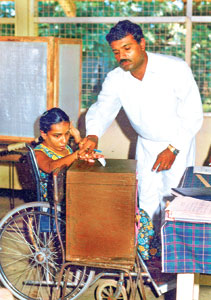We warmly appreciate the continuing endeavours of the Commissioner of Elections and his dedicated staff, to ensure every election is completed in a free and fair manner for all persons.
The way a country treats its ‘dis-abled’ population and the extent to which they are fully-fledged respected citizens in attending to day-to-day normal life, is a realistic, internationally recognized, true measure of a country’s good governance and a far more telling indicator of society’s development than GDP.
An estimated 3 million people - (i.e.15% of our population), for different reasons, are with restricted mobility and/or impaired visually. A large percentage of them are young people - our life force. Furthermore, Sri Lanka has the fastest ageing populaton in our region with over 65 years heading towards 17% of the population.
Every person who qualifies to be an elector and registered in the appropriate register of electors is eligible to vote. Of the estimated 14.5 million eligible voters, around 2 million are physically dis-abled persons.
Safety hazards and rights
However, I am personally aware of many people and, that includes persons with debilitating ailments or conditions that often go unnoticed, persons with restricted mobility and/or visually impaired on the basis of short term or long term physical/sensory disability, elderly and even the pregnant, who although very much desired to go and cast their valuable votes have been reluctantly compelled to refrain from exercising this right, due to potential safety hazards and/or physical barriers either in approaching their polling stations and / or accessing their polling booths – i.e. the right to access, another vital public facility.
 |
| File photo: A differently abled woman casting her vote helped by an election officer |
Although these ‘may be’ few in number and at most places the staff on election duty are quite helpful and understanding, still, in many districts casting their vote could become a crucial deciding factor.
One such example is the polling station at a leading private school in Mount Lavinia at which several disabled persons from the nearby reputed ‘home for the disabled persons’ have to go for their voting at elections.
In spite of the external physical support, I understand approaching this booth is ‘an agonizing battle’ for them.
Enabling the disabled
This article has been written in utmost good faith, to create awareness amongst decision makers, of this prevalent physical problem faced at previous elections by an ever increasing sector of our population that had also contributed to a drop in the percentage of the numbers that actually voted.
Already a formal written request in this regard has been forwarded to all relevant authorities for possible preventive measures.
Furthermore, this writer had taken the initiative in compiling a simple check-list as a guideline and forwarded to the people concerned with the sincere belief that it will help them to promptly identify in advance through a very simple self-audit, any potential physical barriers to access by all at all polling stations and thereafter would easily enable them to eliminate most of them, in the larger interest of a free and fair election for disabled people.
We believe these endeavours would also enable the ‘staff on duty at polling stations’ to be sensitive to the special needs of disabled voters, including those with visual and / or hearing impairments.
We have just been informed by the Elections Commissioner that District Election Officers and Returning Officers, if promptly contacted, will help the disabled to enable them at elections, for which we are grateful.
But what is essential is to inform the public ahead through print and electronic media as a communiqué, on what facilities are available (and from whom) and what procedures are in place to empower a physically or visually impaired voter to overcome these external physical and attitudinal barriers.
Such prior awareness is the only way to encourage the physically disadvantaged eligible voters to cast their votes freely and fairly without discrimination.
The writer, Hony. Secretary-General of ‘IDIRIYA’, is a voluntary disability rights activist and an advisor on accessibility. |


